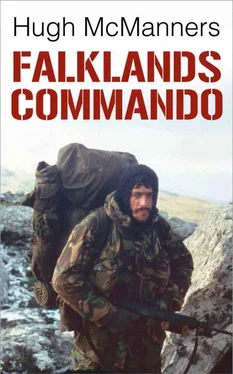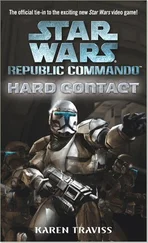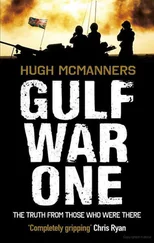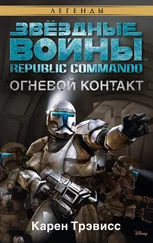Hugh McManners - Falklands Commando
Здесь есть возможность читать онлайн «Hugh McManners - Falklands Commando» весь текст электронной книги совершенно бесплатно (целиком полную версию без сокращений). В некоторых случаях можно слушать аудио, скачать через торрент в формате fb2 и присутствует краткое содержание. Город: London, Год выпуска: 2014, ISBN: 2014, Издательство: Nightstrike Publishing, Жанр: nonf_military, Биографии и Мемуары, на английском языке. Описание произведения, (предисловие) а так же отзывы посетителей доступны на портале библиотеки ЛибКат.
- Название:Falklands Commando
- Автор:
- Издательство:Nightstrike Publishing
- Жанр:
- Год:2014
- Город:London
- ISBN:978-0-992-81540-0
- Рейтинг книги:4 / 5. Голосов: 1
-
Избранное:Добавить в избранное
- Отзывы:
-
Ваша оценка:
- 80
- 1
- 2
- 3
- 4
- 5
Falklands Commando: краткое содержание, описание и аннотация
Предлагаем к чтению аннотацию, описание, краткое содержание или предисловие (зависит от того, что написал сам автор книги «Falklands Commando»). Если вы не нашли необходимую информацию о книге — напишите в комментариях, мы постараемся отыскать её.
Falklands Commando — читать онлайн бесплатно полную книгу (весь текст) целиком
Ниже представлен текст книги, разбитый по страницам. Система сохранения места последней прочитанной страницы, позволяет с удобством читать онлайн бесплатно книгу «Falklands Commando», без необходимости каждый раз заново искать на чём Вы остановились. Поставьте закладку, и сможете в любой момент перейти на страницу, на которой закончили чтение.
Интервал:
Закладка:
This same performance was repeated with various boats several times, and seemed to catch on. Being sporting and gentlemanly (as we were), nobody was so rude and chauvinistic as to invite only the curvaceous blondes to “get their kit off”. There must be some sort of hormone reaction about hundreds of men shouting “Get your kit off” which is irresistible to females, for every boat with women on board eventually followed suit, even several with ladies who’d seemed too respectable and sensible for this sort of thing.
Somewhat upstaged by this development, the gin palace with the blondes came by again and took off all their clothes, to great whoops and whistles of delight.
I noted one particular boat with two particularly prim ladies who’d seemed destined to be the exception that disproved my theory. However later that week, when walking through Southampton I noticed their boat pictured on a display board outside a local newspaper office, with these two standing at the bow as naked as the day they were born – a Paulean ‘conversion’ which must have taken place on the other side of the ship.
On every bit of hard standing, cars were parked with people waving. All the many piers and jetties were packed, banners everywhere, Union Flags on virtually every craft. Canberra had to slow down to avoid swamping these escorts. When craft broke down, other boats took them in tow, or took on the occupants. Every ship we passed hooted, and Canberra hooted in reply.
As we came round the final few bends in the river, it was impossible to tell where our berth was to be because every bit of jetty and standing was completely crammed with well-wishers waving flags. I kept anticipating the terminal, but as we swept onwards I wondered if we should ever get there. The clue was given when finally a team of tugs moved toward us from the starboard side and formed up to port to push us in.
The P&O terminal was totally packed, several bands on the quay, every roof occupied, and the huge embarkment sheds crammed with relatives. They’d organised our families in groups according to unit, so we could find the friendly faces amid a sea of smiles and waves. These groups were easy to locate as the banners being held up were much more specific and personal. One very well-endowed and shapely lady was quick to reveal all from the terminal roof. We had, I suppose, become adept at encouraging this commendable and public-spirited activity.
I scanned the crowd with my binoculars but could see no one, until someone came down from the bow to tell me they’d seen a banner saying ‘Hugh McManners 148’. When I went down there and pushed through to a place on the rail, there was my sister Helen wearing a ‘DeeDee Bobbler’ head thing with springs and green stars that bounced up and down. She struggled off through the crowd to bring my parents and younger sister Ann. We could do no more than shout the odd remark and wave, and it was lovely to see them again.
Once Canberra had tied up alongside and the gangplanks went down, there was quite a long and frustrating wait. By tradition and for the benefit of the media, our brigadier, Julian Thompson, went off first, with the COs of the Commandos and Regiments. The units then disembarked in order, according to a schedule designed to avoid an interminable crush at the single gangplank. We retired to Canterbury Court and drank a bottle of wine.
When our time finally came several hours later and we were called forward over the tannoy, we discovered the rest of the boys had snuck off early. The crowd, which had been clapping ecstatically for several hours, also clapped us off and we were back on terra firma, in England, three and a half months after leaving.
The bands played and the crowd clapped and cheered, and hopefully life was going to become normal and we could forget the military for a while. A huge dog leapt out of the crowd on to Captain Nigel Bedford, licking him furiously, delirious with delight.
It turned into a dream. Our quartermaster, Staff Sergeant Ivor Pothin, was on the quayside with a lorry to load our kit and take it back to Poole, so all I had to do was put a toothbrush and razor into the pockets of the brand-new combat kit that had replaced my ragged Falklands gear.
Reunited with parents and family, we walked up the road past smiling, nodding policemen and hundreds of parked cars. I was at last away from warships, soldiers and the military, although I had no civilian clothes or money, and nothing but the combat kit I was wearing.
But the nightmare continued for my parents. Peter, my younger brother, a troop commander in 9 Parachute Engineer Squadron, remained in the Falklands, clearing minefields which the Argies had not mapped, in contravention of International Law. These clearance operations were to claim yet more lives.
We’d been miraculously lucky. Our only casualty had been Sergeant John Rycroft, on whose head the neon light had fallen during the air raid that so nearly killed Brigadier Julian and his commanding officers. His ‘band-aid’ was now off.
However, we did not escape without tragedy. Back at Poole, during the fighting, our MT (Motor Transport) Sergeant ‘Scouse’ Graham, a very fit, modest and capable man who excelled as a marathon runner, had been taken suddenly ill with a rare form of lung cancer, and died.
Our motivation when we were doing the fighting was very much simpler than the arguments that raged at the time, and which no doubt will continue. We did it for each other.
In my team we each did our best, and were mortified when we made mistakes, and tried to be cheerful when we felt like giving up. We chaffed each other when we were miserable, and joked when we were wondering if we could carry on. We hid our fears, just as we showed them to each other so as to share them. We also shared our letters when the postman had left one of us out.
We did what was needed as firmly as we were able, so it could be finished quickly and we could get back home to our families and friends. I don’t know how I’d have felt if one of my team had been hurt or killed. We were so lucky to have been spared that pain. We would certainly have carried on with the job, if only for the one that was no longer with us.
Most soldiers believe that whatever’s going on, they will not be the one to get hurt or killed. When others are killed they short-circuit the worry is by saying “If it’s got your name written on it, then no matter what you do, it’s going to get you”. This optimistic fatalism is the only way to avoid becoming convinced of the inevitability of death, or worse – mutilation. It would be an impossibly brave man who carried on convinced he was not going to survive.
I suspect that such things as shell shock occur when the resilience of the individual has been taken too far so his optimism is destroyed. It’s probably this which makes you unable to carry on, and so with your sense of purpose destroyed, there’s no point in any of it, and so you crack. Des Nixon used to mutter to himself: “I’m a rubber duck and you can’t crack me”, and he was right.
I was however uneasy about one thing, a very secret thought which came to me unbidden – that it had all been too easy….
This sounds strange, and at the time, I felt it was a very strange thing to be thinking.
Throughout basic training, combat is portrayed as an impossibly difficult, dangerous and arduous thing, and yet I’d emerged in one piece. My underlying emotion was guilt: that it hadn’t been as hard as I’d thought it should have been.
The Army Staff College, Camberley, Surrey, 1984Thus ends the first edition of Falklands Commando – the version that led so many people to join the Armed Forces.
I intend to offer a further book, along the lines of Falklands Commando 30 Years On as catharsis and comfort to the many veterans who’ve been through similar experiences.
Читать дальшеИнтервал:
Закладка:
Похожие книги на «Falklands Commando»
Представляем Вашему вниманию похожие книги на «Falklands Commando» списком для выбора. Мы отобрали схожую по названию и смыслу литературу в надежде предоставить читателям больше вариантов отыскать новые, интересные, ещё непрочитанные произведения.
Обсуждение, отзывы о книге «Falklands Commando» и просто собственные мнения читателей. Оставьте ваши комментарии, напишите, что Вы думаете о произведении, его смысле или главных героях. Укажите что конкретно понравилось, а что нет, и почему Вы так считаете.












